If you’re running a small business, none of these things should be your focus.
The digital marketing strategies that deserve your attention are the unsexy ones.
In this post, we’ll cover seven of those strategies and how to make them work for you based on experience rather than just theory.
Blogging isn’t writing what you did today. That’s a diary.
If you take that approach to blogging, and you don’t already have an existing and loyal audience that hangs on your every word, then your business blog is going to be a ghost town.
How do you fix this?
Write about the problems your target customers are actually searching for.
Say that you sell computer parts online. Chances are your customers are searching for things like:
- Why is my computer so slow?
- How to build a computer
- How to speed up a computer
If we plug those keywords into Ahrefs Keywords Explorer, we see that there are thousands of searches for each of them every single month.

Keyword search volumes via Ahrefs Keywords Explorer.
But here’s the best part:
You can help people solve these problems while integrating products from your store in the content itself.
For example, a slow computer may come down to the RAM, or hard drive, or CPU. So help readers diagnose their problem and offer product solutions in the process.
Same goes for “how to build a computer.” Explain how to do it and recommend the specific components they need.
This concept works in almost every industry.
If you’re a realtor, then instead of blogging about the latest industry award that nobody cares about, write about real-world problems potential customers are searching for like:
- How to invest in real estate
- How to buy a house
- What credit score is needed to buy a house
All of these topics have the potential to attract a vast audience:

Not just any audience, either: these are people in the market for what you offer, who likely have deep pockets and a burning desire to own their own home.
But how do you find what your audience is searching for?
The first option is to guess. The second and better option is to use a tool like Ahrefs Keywords Explorer and search for some relevant seed keywords. For a realtor, these might be things like “buy a house,” “real estate,” etc.
From here, head to the “Questions” report to see the most popular questions people are asking.
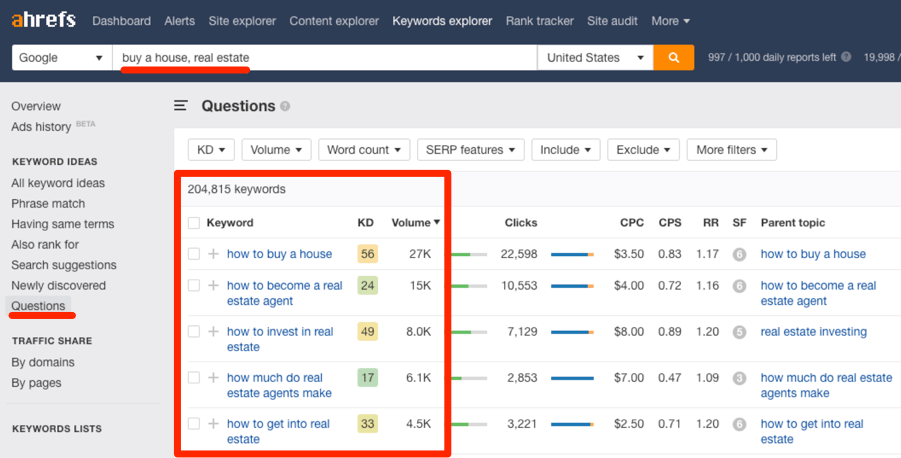
It’s then just a case of picking out the best keywords for your business, analyzing keyword difficulty, and creating optimized content.
If you can do this and rank, you’ll get free, consistent, and passive traffic from Google month after month.
YouTube is the world’s 3rd biggest search engine, and it’s yet another place where people are searching for solutions to their problems.
For example, there are 17,000 monthly searches worldwide for “makeup for beginners”:
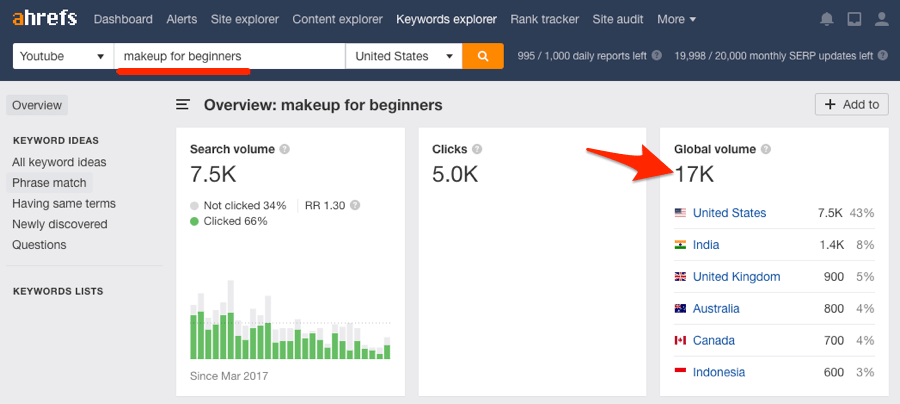
Now, I’m no expert, but I’m guessing that it’s easier to pull off this look when you use the right makeup and brushes.
So if you were a retailer of makeup and makeup accessories or even just an affiliate, then you could easily create a video about this topic and recommend a few products in the process.
This is what popular vloggers like Danielle Mansutti do.
Danielle’s video ranks #1 on YouTube for “makeup for beginners,” and her video has racked up over 2.6 million views to date:

Throughout the video, she recommends the best products to use and tells you where to buy them in the video description:
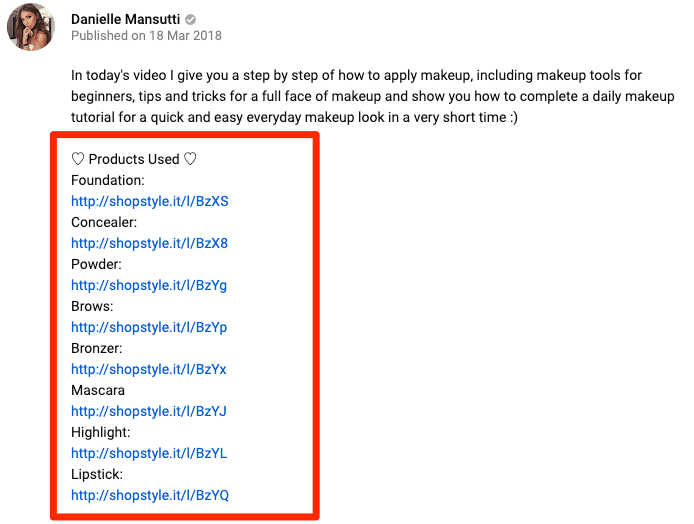
Furthermore, because Google now shows video results for a lot of searches, her video also ranks in Google for related terms.
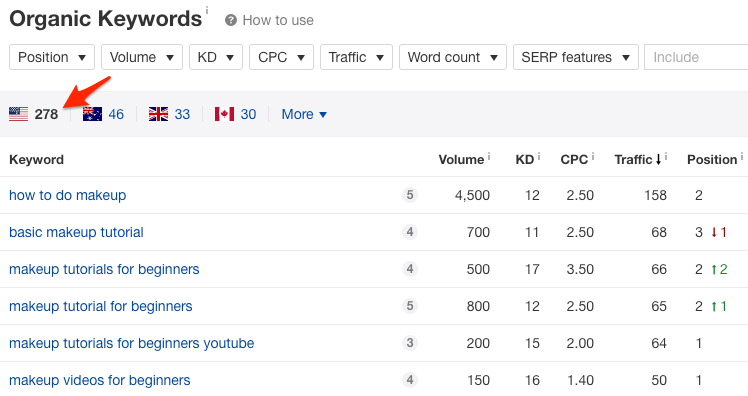
In fact, that video gets an extra 2,900 visits per month from Google alone:

Back to business: To find relevant topics that people are searching for on YouTube, go to Ahrefs Keyword Explorer, switch the search engine to YouTube, and search for a broad keyword in your industry.
If you sell iPhone cases, then this would be something like “iPhone” or “iPhone X”:
From here, check the “Questions” report to see what questions people are asking about this topic. Right away, you’ll see some great topic ideas like “how to unlock iPhone 6” and “how to replace iPhone 6 screen”:
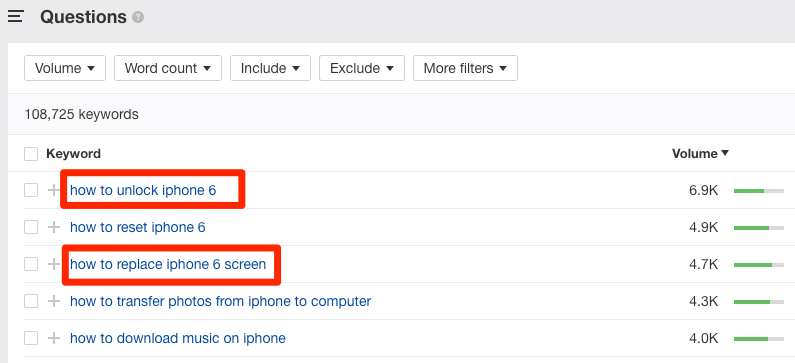
The latter is a particularly good keyword to target as an iPhone case seller because viewers will likely want to take more care of their phone once fixed—in which case, they may want to buy a case.
For best results with this strategy, make your videos are genuinely helpful and valuable, keep the fluff to a minimum and refrain from being overly promotional.
Doing this has helped us to grow our YouTube channel to over 150,000 monthly views…
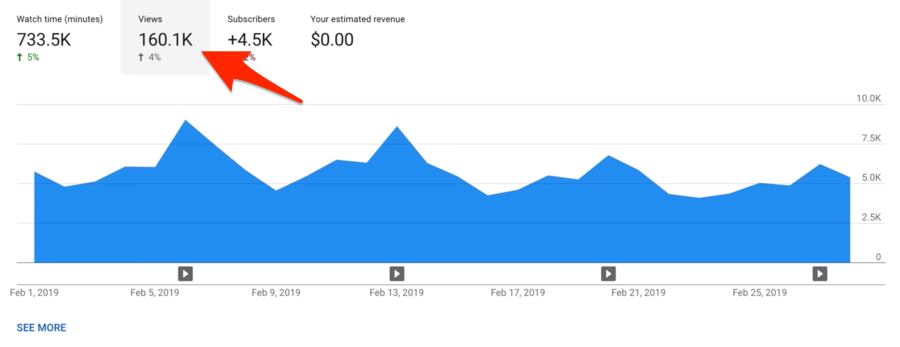
… which has led to thousands of new paying leads and customers:
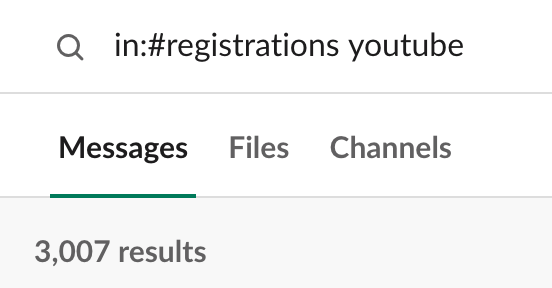
Learn more about ranking your videos and growing your channel in our guide to YouTube SEO.
Most businesses’ social media marketing strategy can be summed up in one sentence:
Keep posting boring updates and promotions to followers across every channel.
If that’s what you’re doing, stop now. That’s not a social media marketing strategy; it’s merely a way to waste time and alienate your followers.
So what should you be doing?
Here are a couple of tips.
Focus on one social network
Building a following takes time and effort. If you spread yourself too thin, then it’s not going to work out.
For that reason, it’s better to focus on just one social network, at least initially.
But which one should you choose?
Contrary to popular belief, it’s not necessarily the one with the most users. It’s about finding the network where your target audience hangs out and understanding whether you can serve their reason for being there.
If you have your finger on the pulse in your industry, then that first part shouldn’t be too difficult.
For example, most SEO professionals hang out on Twitter or Facebook. Few of them are on Snapchat or Instagram—at least not in a professional capacity.
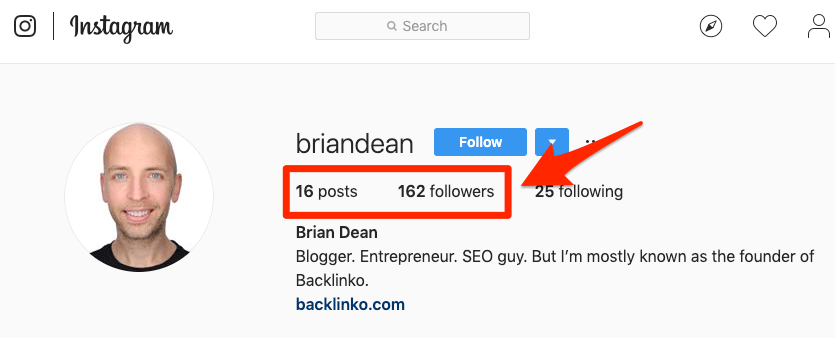
So, for us, we’d want to focus on building a following on either Twitter or Facebook.
However, if you’re a food blogger, Pinterest would likely be a better option.
But what about that second part of the equation?
Cater to the platform
Regardless of the platform you choose, you need to make an effort to understand why your audience is there and how you can serve them.
For example, people tend to go to YouTube for entertainment or to learn something.
Facebook, on the other hand, is different. People don’t want to see 30-minute tutorials or promotions popping up in their newsfeed. They want to see interesting, funny, or shocking content which they can share with friends.
To get peoples’ attention here, you need to tell a story, create a short video, or do something else that’ll stand out in an endless sea of promotions and vanity shots.
On Twitter, it’s more about communicating quickly, efficiently, and not overwhelming people.
That’s probably why we tend to get more attention on the short tips we share…
#SEO tip 48: Answer questions on Quora/forums to build traffic-driving links 🔗
Participate genuinely and answer questions.
You’ll be able to share the occasional link that will bring traffic back to your site! 📈📈https://t.co/hjdvViYB05
— Ahrefs (@ahrefs) June 10, 2019
… than links to in-depth YouTube videos:
📽️ Digital Marketing for Beginners: 7 Strategies That Work by @samsgoh
SEO. Social media marketing. Email marketing. PPC ads.
Where do you even start? 😰
🔽 Here’s exactly how all of these work – based off a decade of experience rather than theory.https://t.co/OrJ9czQV6D
— Ahrefs (@ahrefs) May 22, 2019
There are two ways to market your business with podcasts:
- Create your own podcast
- Get interviewed on someone else’s podcast
Creating a podcast is great for brand and audience building, but it can take a while to build traction. Also, most of us don’t have the equipment or industry connections to create a popular podcast.
Getting interviewed on podcasts is a different story.
Podcasters are always on the lookout for interesting people to interview. You don’t have to be a celebrity for this. As long as you have some industry experience (online or offline) and are willing to share some serious value, you’ve got what it takes.
Don’t believe me? I’m a nobody and I’ve still being interviewed on podcasts:

But how do you find podcasters that might want to interview you?
Look through your favorite podcasts for interviews of others in your industry.
Looking at the podcast page for Entrepreneur on Fire, we see this episode with Jim Kwik.
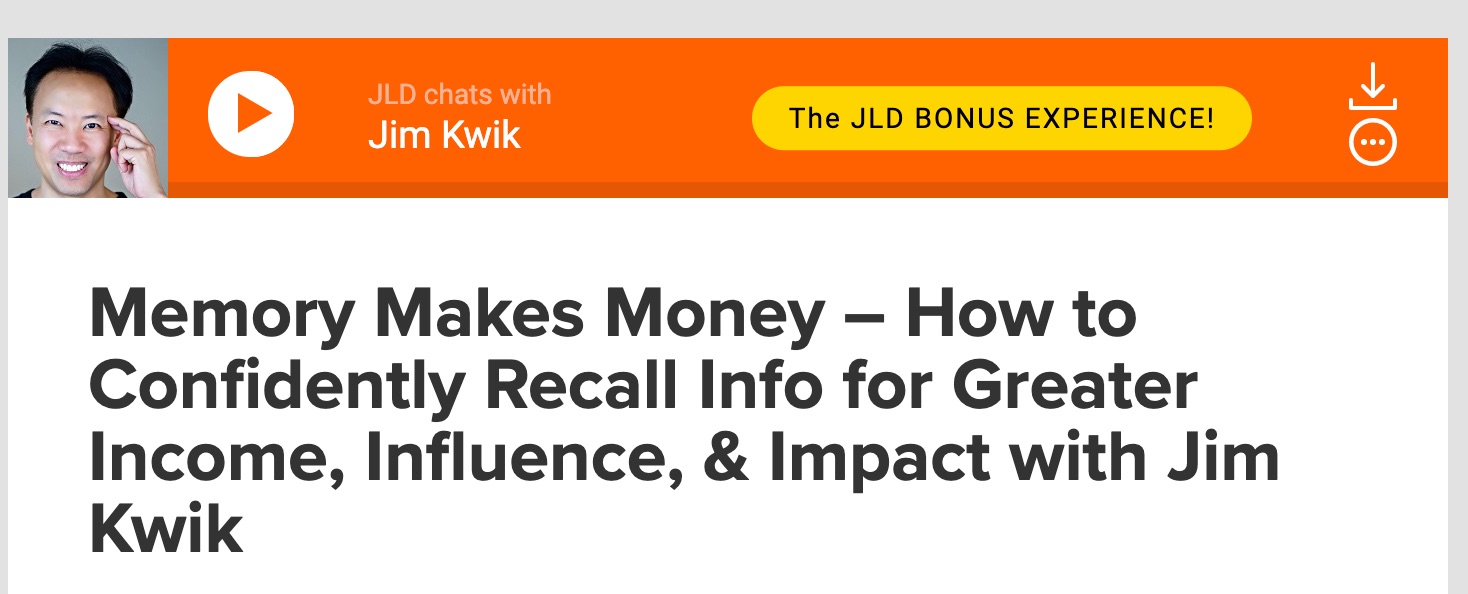
If we then click through to the interview, we notice two things:
- The guest’s name is in the title.
- The page links to the guest’s website—specifically, the homepage.
Both of these are very common for podcast interviews, and we can use that fact to help discover other podcasts that this person has been on.
How? Paste the person’s homepage into Ahrefs Site Explorer, set the mode to “URL,” then go to the “Backlinks” report.
Next, use the “Include” filter to see only backlinks where the person’s name is in the title of the referring page.
Now we have a list of over 100 podcasts featuring Jim.
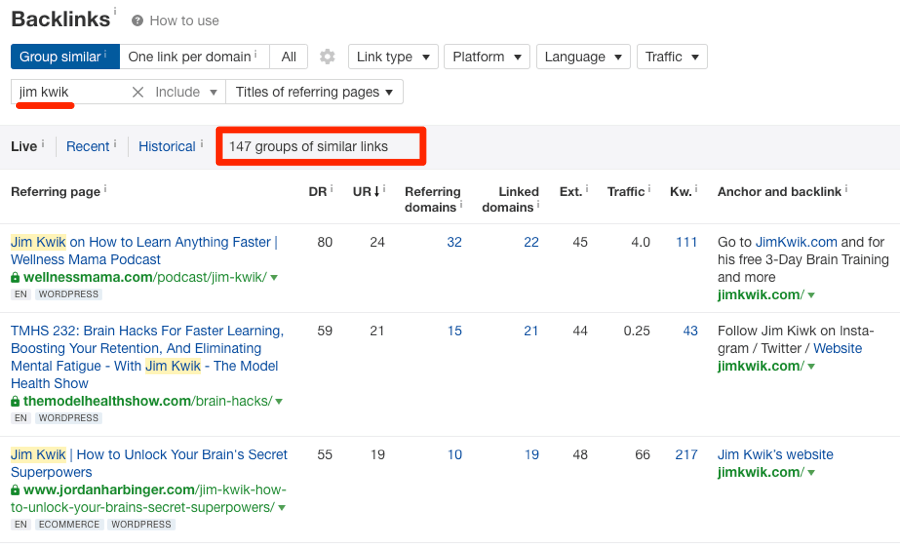
From here, all we need to do is filter through to find relevant prospects, then pitch the host by telling them why they should interview us and what we have to offer their audience.
Although podcasters usually link to their interviewee’s website from the episode page, that isn’t always the case. Sometimes they link only to their social profiles.
For that reason, it’s often worth repeating the process above but with the interviewee’s social profile URLs.
For example, if we repeat the steps with Jim’s Twitter URL, we find this podcast:

This didn’t show up when we analyzed links to his website because the episode page doesn’t link to it.
Each time we publish a new blog post, we send out a newsletter.
It takes minutes to do, and it sends thousands of people to our blog.

But this didn’t happen overnight…
We’re able to do this now because we’ve spent years building our email list, and now have tens of thousands of subscribers who actually want to hear from us.
So if you haven’t yet pulled the trigger when it comes to email marketing, the best time to start is right now.
How? The first step is to generate traffic to your site.
There are plenty of ways to do that, but blogging with SEO in mind (see #1) is the best long-term strategy. We’ve been focused heavily on this for a few years, and we now get an estimated ~230,000 monthly visits to the Ahrefs Blog.

The next step is to convince those people to sign up to your newsletter.
There are lots of tips and tricks for doing this: Lead magnets, content upgrades, etc.
But the thing that unites all of these tactics is providing something of value. It might be a PDF version of the post (content upgrade), a free 7-day email course (lead magnet), or something else.
Here at Ahrefs, we keep things simple with a slide-in that triggers at the end of a post…
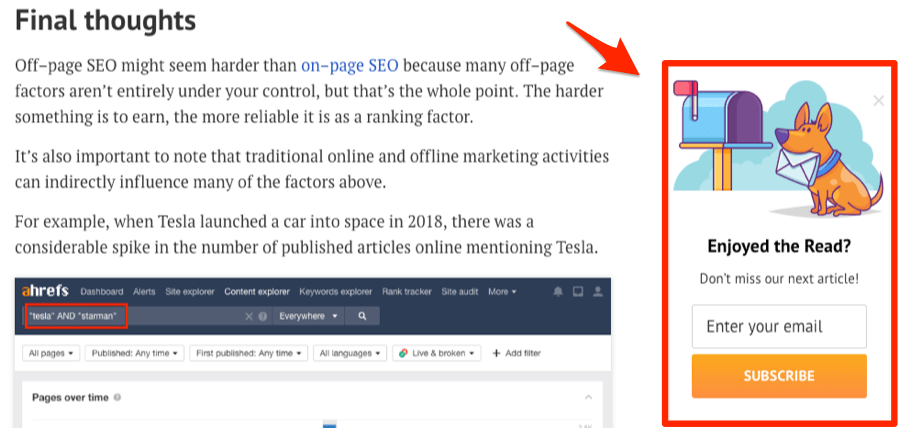
… and a subscribe box at the bottom of each page:

This works well for us, but you may want to be a little more aggressive with your opt-ins if building your list is a priority.
Just remember that list building is not something with a beginning and an end. It’s an ongoing process, so don’t put off emailing your list because you’re scared it’s not big enough.
Make an effort to keep subscribers engaged and send them valuable information—even if you don’t have many.
Do that consistently over time, and you’ll have an engaged, responsive list of people that actually enjoy hearing from you.
Communities and forums like Reddit, Quora, and Facebook pages can be great marketing channels.
Just remember a few critical rules:
- Never try to promote products and services directly. People often browse these platforms for entertainment or education. If you can’t do either of those things, don’t bother.
- Link to your content sparingly, and only where appropriate. Most of the links on these platforms are nofollowed, meaning they have no SEO value. For that reason, there’s no need to spam—link to your content where it has value and supports a point.
Think of these networks as a place to share expertise, experiences, build relationships, and help others.
That’s what my colleague Si Quan does on Quora.
Here’s his answer to the question, “How long will it take a new website to rank in Google?”
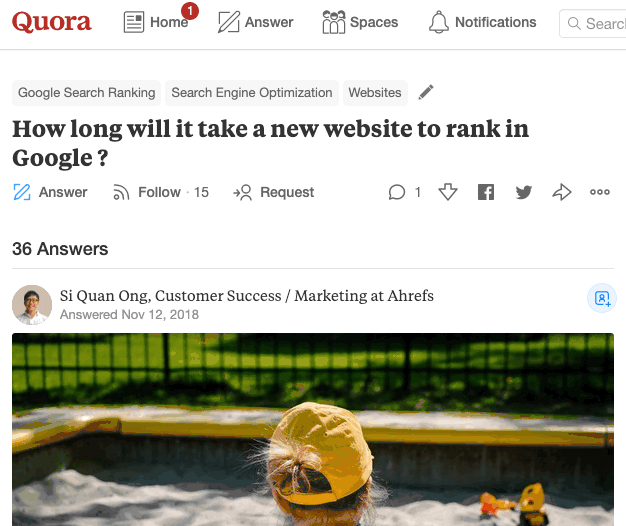
It’s super in-depth and answers the question well.
That’s likely why it’s the most upvoted answer on the thread and has racked up over 5,500 views in the last ~six months.
But he also took the opportunity to link to a couple of relevant Ahrefs blog posts:
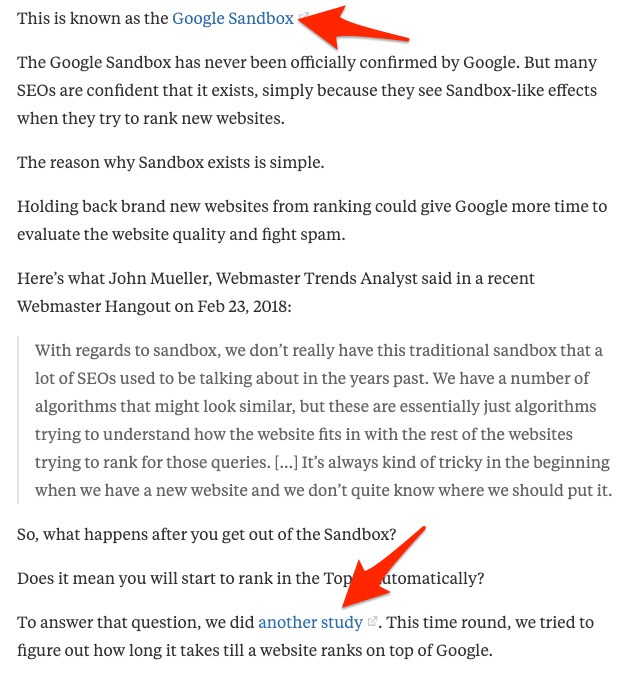
The key point there is relevant. He didn’t link to our homepage or a landing page. He linked to blog posts with more information about the things he was already talking about—which is useful.
Even if only 1% of the people who’ve viewed that answer click a link, that’s 55+ new readers from just one answer.
But he hasn’t just answered one question. He’s answered 350+.
Combined, those answers have racked up almost 800,000 views to date…
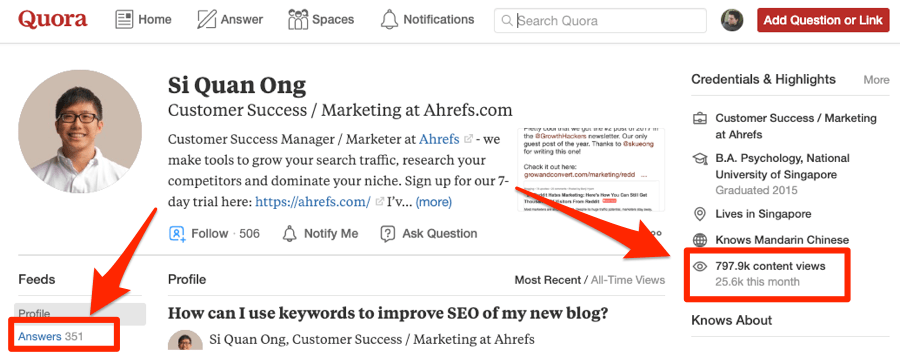
… and now get tens of thousands of views every month with no additional effort.
Looking for a way to find relevant and popular questions to answer on Quora?
Follow the process in the video below, and pay attention to the bonus traffic hack:
He also answers relevant questions in Facebook groups from time to time.
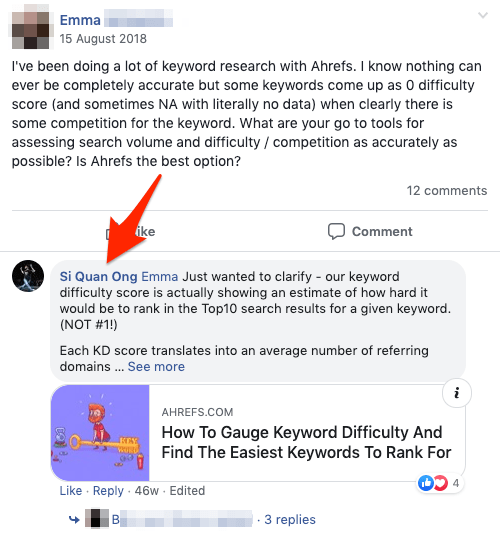
Most small businesses never even consider paid ads because they aren’t “free.”
But remember, nothing is truly free because everything takes time. And time is money.
For that reason, there’s no need to shy away from paid advertising. What you do want to avoid, however, is throwing money blindly into an ad network because somebody somewhere said it was good.
Remember, what works for one person may not work for the next.
So before you start pumping money into paid ads, consider the ABCs of paid advertising success:
- A is for Audience,
- B is for Budget,
- C is for Commerciality.
Let’s start at the top.
Audience
Say that you’re selling men’s caffeine shampoo, would you advertise on Pinterest?
Probably not. 81% of Pinterest users are female, and it’s a platform used primarily by the younger generation.
So the first step is to figure out which platform your target audience uses.
Advertising anywhere else will be money down the drain.
Budget
Most PPC ads work on an auction basis, meaning that the more advertisers there are, the more expensive it gets for you and me.
Say you’re in the competitive industry of conference calls. If we search for that keyword in Ahrefs Keywords Explorer with Google set as the search engine, the cost per click (CPC) is $20 in the US.
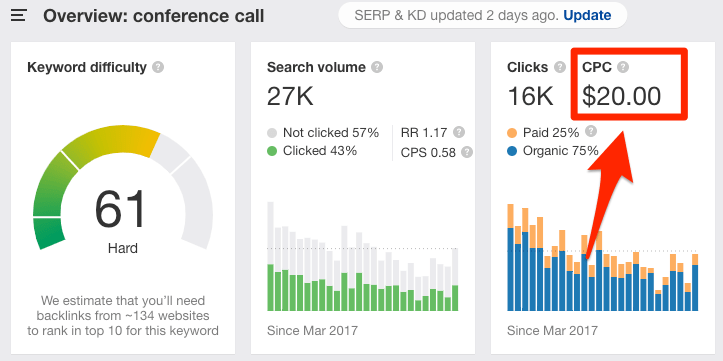
If you have a paid advertising budget of $1,000 per month, then you’d only be able to get 50 clicks before your budget is depleted.
How can you solve this? Look for keywords with a lower cost per click.
To do this, enter a seed keyword (e.g., conference call) in Ahrefs Keywords Explorer, then go to the “Phrase match” report to see all keywords from our database containing that keyword.
From there, filter for the maximum CPC you’re willing to spend, and look down the list for lucrative opportunities.
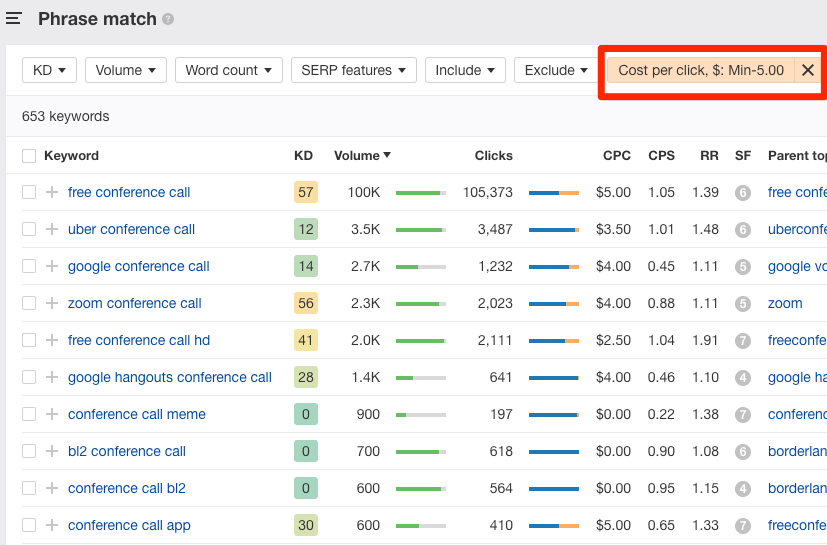
Some good ones here might be “video conference call app” and “conference call app.”
Not only are these cheaper keywords, but they also have clearer search intent. Someone searching for “conference call app” is obviously looking for an app that does conference calls, whereas someone searching for “conference call” could be looking for many different things.
But don’t forget, PPC is bigger than just Google. You can also advertise on other platforms like Facebook, Twitter, Pinterest, YouTube, etc.—which are often cheaper.
Just make sure your target audience actually hangs out there.
Commerciality
If you’re bidding on a keyword like “conference call app” in Google, then it may make perfect sense to send visitors to an informative landing page.
But that won’t work on platforms like Facebook or Pinterest.
Nobody there is in buying mode.
So you need to bridge the gap between the intent of the platform and how you monetize your products. And the way you do that is with content.
Say that you sell furniture and want to advertise on Pinterest. You wouldn’t want to send people to sales pages for tables and chairs because people on Pinterest aren’t looking for that. They’re looking for inspiration.
So it would make more sense to send them to a relevant blog post like “11 Interior Design Tips For Your Living Room That Won’t Break the Bank.”
You can then show relevant products naturally throughout the content, much like IKEA does.
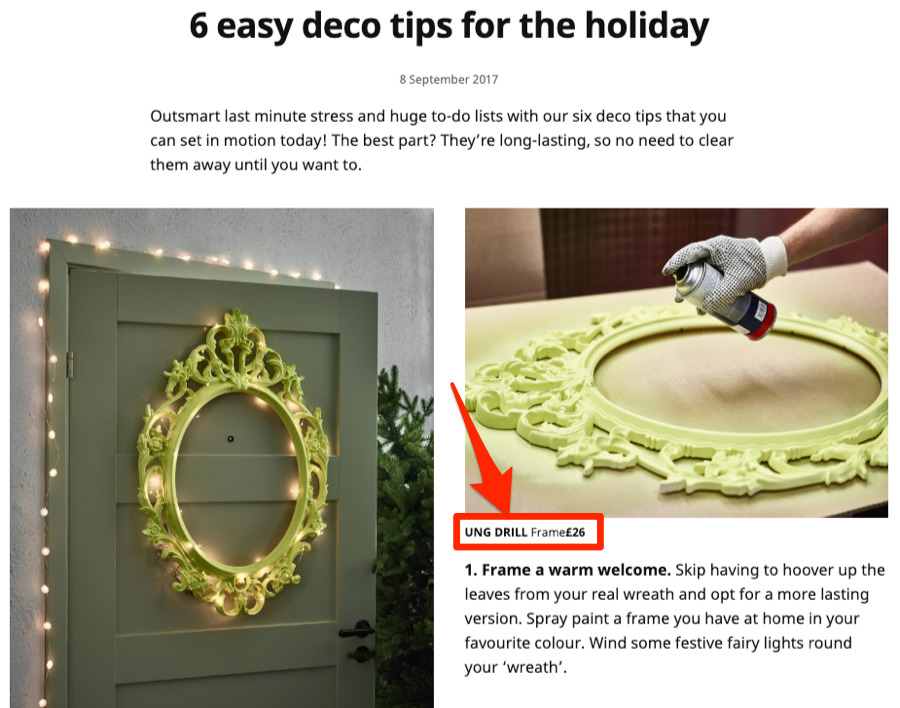
Final thoughts
The key to digital marketing success in today’s climate is to adopt the mindset of the consumer.
In other words, stop giving people the hard sell, and instead aim to solve their problems through free and valuable content that is relevant to your business.
That’s what we do here on the Ahrefs Blog, and it’s been working pretty well for us.
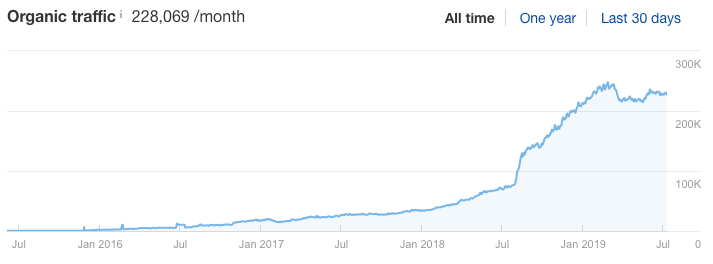
It’s also important not to try the strategies above all at once.
Pick one of them, then experiment with and master it before moving on to the next.
Let me know in the comments if any of these strategies have worked for you. And if so, which was the most effective?




